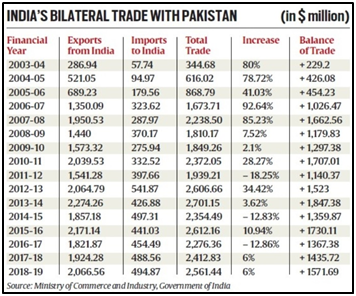Why in news?
Recently, Pakistan’s Foreign Minister Muhammad Ishaq Dar said that his country may seriously examine the question of resuming trade with India.
Pakistan had stopped trade after the constitutional changes in Jammu and Kashmir in 2019.
What’s in today’s article?
- Bilateral trade between India and Pakistan
- Why might Pakistan be reconsidering trade with India?
- Challenges to normalisation of India-Pakistan trade
Bilateral trade between India and Pakistan
- Composition of India-Pakistan trade

- Despite having MFN status since 1996, Pakistan maintained a Negative List of 1,209 products that were not allowed to be imported from India.
- Most Favoured Nation (MFN) status is a principle in the WTO that ensures that countries treat all other members equally.
- This means that if a country improves the benefits it gives to one trading partner, it must give the same treatment to all other WTO members.
- Only 138 products were allowed to be imported from India through the Wagah-Attari border land route.
- Still, India maintained a significant trade surplus over Pakistan.
- In 2018-19, cotton and organic chemicals accounted for around half of Pakistan’s imports from India.
- Other major Pakistani imports from India that year included plastic, tanning/dyeing extracts, and nuclear reactors, boilers, machinery, and mechanical appliances.
- Meanwhile, India’s imports from Pakistan in 2018-9 included mineral fuels and oils, edible fruits and nuts, salt, sulphur, stone and plastering materials, ores, slag and ash and raw hides and leather.
- Why was India-Pakistan trade paused?
- Pakistan suspended bilateral trade with India in August 2019, after the Indian government abrogated Article 370 of the Indian Constitution.
- The now-scrapped article gave a special status to the erstwhile state of Jammu and Kashmir, following its accession with India in 1947.
- However, experts believe an underlying reason for suspending trade was the 200 per cent tariff imposed by New Delhi on Pakistani imports earlier that year after India revoked Pakistan’s MFN status.
- India took this step in the aftermath of the Pulwama terrorist attack in February 2019.
- India withdrew Pakistan’s MFN status within 24 hours of the attack.
Why might Pakistan be reconsidering trade with India?
- Change of government in Pakistan
- There has been a change of face, if not regime, since Imran Khan following elections held earlier this year.
- While the Pakistani military remains firmly in control, a new government indicates the possibility of a new policy.
- Economic crisis in Pakistan
- Devastating floods in 2022, high inflation, and political instability alongside structural issues, have led to multiple crises related to meeting the food and energy needs of the population.
- Pakistan is approaching IMF and friendly countries for loan
- Pakistan has had to frequently approach the IMF or friendly countries like Saudi Arabia and China for billions of dollars in loans.
- With the pause in trade with India, importing goods from faraway countries further depletes its low foreign exchange reserves.
- Direct trade will increase the efficiency
- Trade between India and Pakistan is already taking place through Dubai or other countries.
- This raises costs, and the logic of efficiency and geography demand a resumption of direct trade.
- Pakistan’s relationships with Afghanistan and Iran have become tense
- In fact, Pakistan’s ties with India are more stable than its western frontier with Afghanistan and Iran.
Challenges to normalisation of India-Pakistan trade
- Role of hardliners
- Given that PPP chairman Bilawal Bhutto Zardari has taken a hard line against India in public statements over the last few years, it is not clear if his party will support trading with India.
- Role of Pakistani Army
- Pakistani army traditionally opposes any steps taken to normalise the relationship between these two countries.
- Pakistan’s demand on Article 370
- Pakistan has put preconditions on talks with India, demanding the reversal of the decision on Article 370 — which will not happen.
- Terrorism
- India too would not want to trade without major steps from Pakistan on curbing terrorism.
- External Affairs Minister S Jaishankar has frequently said trade and terrorism cannot go together.
Conclusion
Today, India’s position is stronger, and the Indian government is not going to make any concessions. The ball then is in Pakistan’s court; and there is no domestic consensus on how to reset ties with India. This is the problem: trade with India makes economic sense for Pakistan. But the politics of doing the right thing are quite hard in Pakistan.










